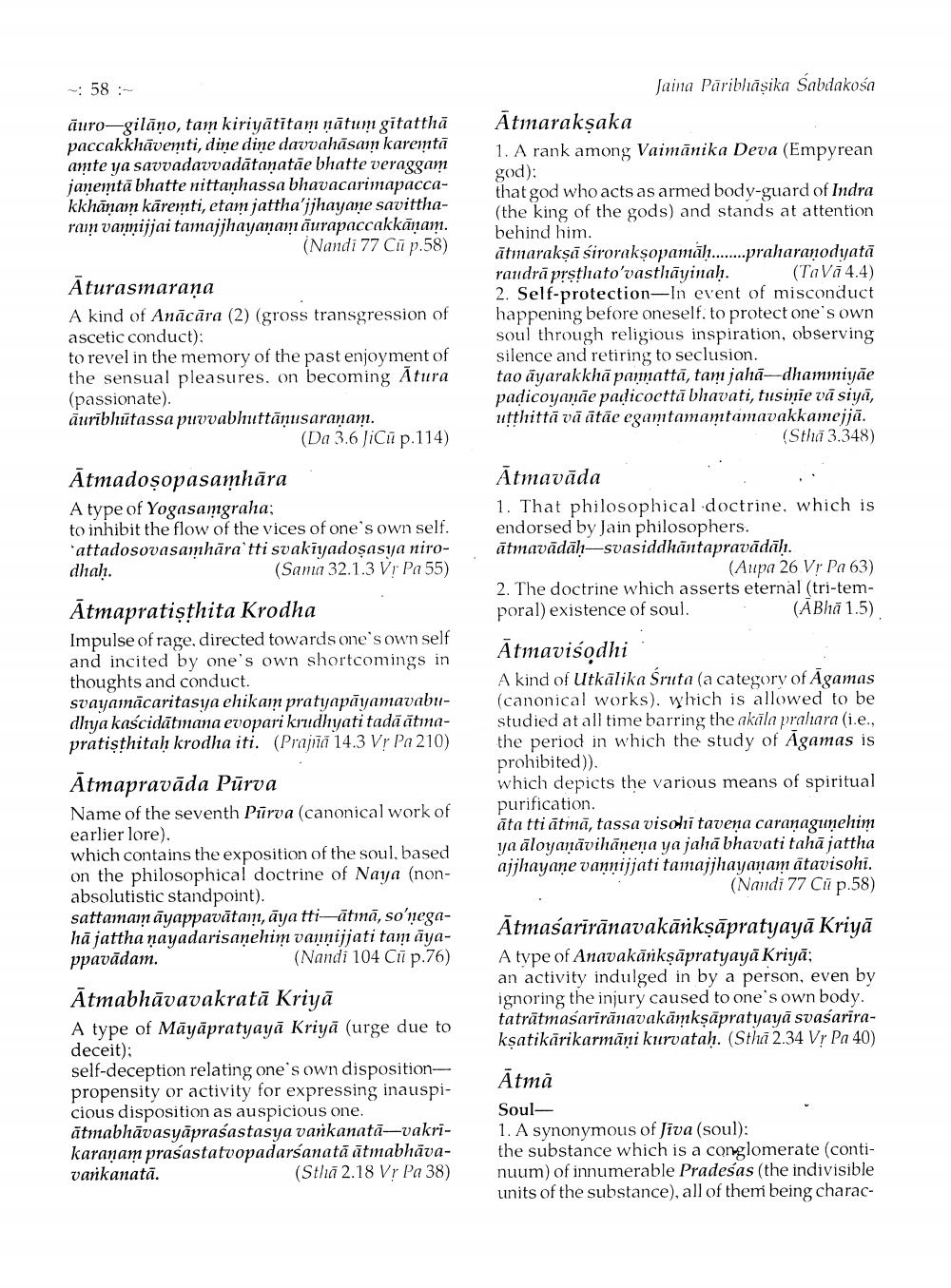________________
58:
duro-gilano, tam kiriyatitam natum gitatthä paccakkhaventi, dine dine davvahasam karetä amte ya savvadavvadataṇatãe bhatte veraggam janemta bhatte nittanhassa bhavacarimapaccakkhanam kārenti, etam jattha'jjhayane savittharain vanijjai tamajjhayanam aurapaccakkanam. (Nandi 77 Ci p.58)
Āturasmaraṇa
A kind of Anācāra (2) (gross transgression of ascetic conduct):
to revel in the memory of the past enjoyment of the sensual pleasures, on becoming Atura (passionate).
auribhutassa puvvabhuttanusaranam.
(Da 3.6 JiCi p.114)
Atmadoṣopasamhāra
A type of Yogasangraha
to inhibit the flow of the vices of one's own self. "attadosovasamhära'tti svakiyadoṣasya niro(Sama 32.1.3 Vr Pa 55)
dhah.
Atmapratisthita Krodha
Impulse of rage, directed towards one's own self and incited by one's own shortcomings in thoughts and conduct. svayamacaritasya chikam pratyapayamavabudhya kascidätmana evopari krudhyati tada atmapratisthitaḥ krodha iti. (Praj 14.3 Vr Pa 210)
Atmapravada Pürva
Name of the seventh Purva (canonical work of earlier lore).
which contains the exposition of the soul, based on the philosophical doctrine of Naya (nonabsolutistic standpoint).
sattamam ayappavatam, aya tti-ätä, so'negaha jattha nayadarisanehim vannijjati tam ayappavādam. (Nandi 104 Ci p.76)
Ätmabhävavakrata Kriya
A type of Mayapratyaya Kriya (urge due to deceit);
self-deception relating one's own dispositionpropensity or activity for expressing inauspicious disposition as auspicious one. atmabhavasyāprasastasya vankanată-vakrikaraṇam prasastatvopadarśanata ātmabhavavankanatā. (Stha 2.18 Vr Pa 38)
Jaina Paribhasika Sabdakosa
Atmarakṣaka
1. A rank among Vaimanika Deva (Empyrean god):
that god who acts as armed body-guard of Indra (the king of the gods) and stands at attention behind him.
atmarakṣā siroraksopamah...praharaṇodyata raudra prṣṭhato'vasthayinah.
(Tava 4.4) 2. Self-protection-In event of misconduct happening before oneself. to protect one's own soul through religious inspiration, observing silence and retiring to seclusion.
tao ayarakkha pamatta, tam jaha-dhammiyäe padicoyanae padicoetta bhavati, tusiņie va siya, utthittävä ätäe egamtamamtamavakkamejja.
(Sth 3.348)
Ātmavāda
1. That philosophical doctrine, which is endorsed by Jain philosophers. atmavādāḥ-svasiddhäntapravādāḥ,
(Aupa 26 Vr Pa 63) 2. The doctrine which asserts eternal (tri-temporal) existence of soul. (ABha 1.5)
Atmavisądhi
A kind of Utkalika Śruta (a category of Agamas (canonical works), which is allowed to be studied at all time barring the akāla pralara (ie., the period in which the study of Agamas is prohibited)).
which depicts the various means of spiritual purification.
āta tti ātmā, tassa visoki tavena caranagunehim ya aloyanavihaṇena ya jaha bhavati taha jattha ajjhayane vannijjati tamajjhayanam atavisohi. (Nandi 77 Cap.58) Ātmasariränavakänkṣāpratyayā Kriya A type of Anavakänkṣāpratyaya Kriya an activity indulged in by a person, even by ignoring the injury caused to one's own body. taträtmasariranavakankṣäpratyaya svasarirakṣatikarikarmäni kurvatah. (Sth 2.34 Vr Pa 40)
Ātmä
Soul
1. A synonymous of Jiva (soul):
the substance which is a conglomerate (continuum) of innumerable Pradesas (the indivisible units of the substance), all of them being charac




